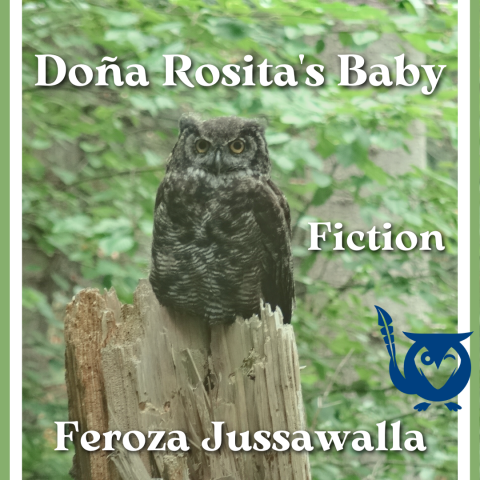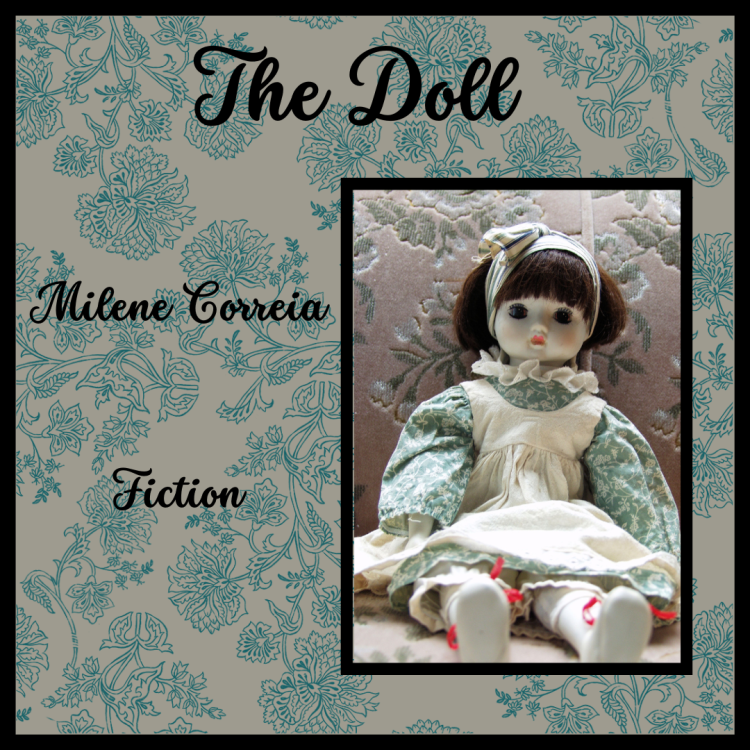Doña Rosita’s Baby

Image created onCanva
Doña Rosita came home from work in El Plaño to find three large great-horned owls atop the pine trees behind her desert home in Las Crucitas. Owls, she had always been taught in her Deccani plateau home in southern India, were bad luck, often foreboding death.
Fear clutched Rosita’s heart, locking up her mind. What should she do? She had already had trouble: car trouble, roof trouble, baby trouble — miscarriage upon miscarriage.
Surely some bruja has sent this to curse me! she thought.
In India, the remedy would be different. But here she knew she had to hold up a rosary and a cross — not just a cross, but a cross with turquoise in the center — and of all things, her real South Indian name, was the Arabic word for turquoise. “Turquoise! I who am named turquoise must go in search of turquoise,” she thought to herself.
But night was closing in. Her husband had gone job hunting and would be away. She was alone in the big hollow house at the edge of the mesa, with her delicate little ten year old son, wise for his years, always comforting his mother.
Good nurse, she called him, as he was always nursing her wounds and fears. But this night, both were afraid as the owls scritch-scratched the skylight. Rosita feared one would break through the skylight and steal her child or bring death again to the one in her womb — the girl she had longed for.
Doña Rosita got in her ramshackled orange Ford Pinto — the kind that self combusted with rear end collisions. Sometimes they just self-combusted in the heat, magically. Yes, magically.
And it seemed magically she wended her way through interminable dusty, congested streets at right angles, gutted with the tracks of once-there street cars, now filled with dusty buses bearing alien laborers, cleaning ladies, janitors, makers of frijoles and fajitas. Until she came upon a small, dark shop front next door to Lupita’s Café Mexicaño.
This is where she had been sent by Anna Luisa, her student who knew everything and everybody and everywhere in El Plaño, Tejas. “Yes, Miss,” Anna Luisa had said. “Antonia Garcia, in the Ave Maria bookshop on San Antonio street. You must go there. She have all the remedios — you know, for wanting babies, killing lovers, jealous wifeses — all, Miss. You must go there..
Okay, Doña Rosita thought. We used to do that in India, too. Spells, bindings, amulets. Eggs circled and cracked around heads, on front steps. Coconuts smashed before front doors. l’ve done them all. Sandalwood sticks for Kali, coconuts for Avan, smudge for the Great Spirit. So, might as well…
Doña Rosita had come from India to teach at the University of Rio Pequeño. People used to call it the Rio Grande but soon realized that the rio never got grand and there was only a tea cup of water that Mexicaño immigrants could just step over in their illegal entries to the U. S. So, people had come to call it the Rio Pequeno.
Some even went so far as to call it the Rio Puerco. Dirty, filthy, nasty. Filled with the blood of aspiring illegals, border patrol agents, even local native Hispano goatherds, killed mistakenly by the Marines.
Doña Rosita had come from India. Just like the Chine Poblana. But Doña Rosita had come willingly, looking for a job. Just like the Mexicaños, “dusty bottoms, wet backs,” all the names the migrant workers were called who were looking for a job in this land of milk and honey. But the Chine Poblana was dragged.
Pobrecita, poor thing, was taken around 1100 A.D. The daughter of a king called Indraprastha. She was kidnaped and taken to Spain, then sold into slavery to conquistadores who brought her to Puebla, Mexico, where she became a rodeo queen. She was most useful, to the Mexicanos as she knew all about herbs and healing; herbs for dysentery and other dire diseases.
The Chine Poblana had made herself right at home. The hills looked like those around her home in the Deccani Plateau: gray, dusky, barren. Nothing grew in the salty earth. But the sky was always blue and, though it got colder than where she came from, she got used to that.
The central Indian plateau was just like the Mexican llaños, dry red earth and sand hills. And she, the Chine Poblana, knew how to turn the soil and grow things. She knew how to take the colors out of the hills to dye things, to smell the desert earth flowers and make teas.
She ground corn and made flat breads, chapattis, puris, tortillas, and Indian fry bread. And she made them all by hand. She got up early in the morning to grind the corn in stone bowls with other stones, just like they did in India, on masala pathers
At home she was used to brass bowls all carved and decorated. After all, she was a prince’s daughter.. The people of Puebla, assuming she came from China, gave her the name Chine Poblana.
The similarities between Pobrecita – Chine Poblana – and Doña Rosita were many: they both originated in the Deccani Plateau.They were both transplanted into the desert of the Southwest of the North American continent. But one had been a princess and the other had come looking for work. Both had their names changed because the local people did not know these ‘f’reners’ – foreigners, others, different peoples.
Doña Rosita’s name was not Rosita. But everyone called her that anyway. They could never get her name right: first or last name.
It was foreign to them, though she looked like one of the folks from up there in the hills. Hispanos. Indios. Meztizos. All mixed up like an ensalata mista — bittersweet leaves of chicory and sweet cherry tomatoes and pinon nuts and sunflower seeds — mixed with salt. Some bitter bites and some sweet.
In her own country, Doña Rosita was named the Arabic-Persian-Hindustani word for “turquoise.” But nobody on this new continent could say it. It was ironic that she had ended up here in the land of “Indian” jewelry — all turquoise set in silver — for her name translated from her own languages, Hindi, Urdu, Persian – all mixed up, was “turquoise silversmiths.”
That’s how they made up names in India: “wala” they added to the trade, so that there were Sodawaterwalas and Sodawater-bottleopenerwalas, and Coachbuilderwalas. You know, just like there are people here whose names are Veteranos because they were veterans.
Some who couldn’t say her real name and wanted to call her by it called her Ferocious, because she was feisty. She was always fighting for this or that, or because she thought she had rights.
She always thought she should have more than she did — especially in a country then called the U.S. of A!
But what she wanted most was a baby girl. Her son whom she loved dearly resented that, and yet comforted her every time she lost a baby. He sat with her on the sofa, stroking her head asking, “No baby sister again?”
She wanted to have a baby. She loved the little wrinkly faces on the papoose dolls she collected from “Indian Market” every August in Santa Fe. “Indian Market,” she insisted – her kind of Indians – the same people. And she wanted one of her own. A live one. “We’re dying out,” she would say to her Mormon husband.
“Maybe God meant you infidels to die out anyway,” he would say.
But they tried and they tried. Soon as it seemed a seed fell in her womb, she’d drop it. “Witchcraft,” she’d say. Witchcraft. And in fact one morning she walked out and…
They had painted her desert. Yes, around her house on the mesa, they’d painted her desert. With large, red, round garden cinder blocks.
She had taken her cup of tea to her porch swing to sit and look out over the mesquite after a rare rain had the desert fragranced with mesquite-creosote. When she did, she found the cinder blocks scattered around the desert on her mesa-top home.
She walked out a bit farther and saw torn up books in the dry arroyo, a bit damp from the sprinkling of rain. There, too, a mangled baby doll and broken tea cups had collected. And archery arrows from her neighbor had been plucked off his target, and one arrow was purposefully pointed toward her bedroom.
Doña Rosita’s husband came out with his mug of coffee and looked around. “The neighbors’ girls must’ve had a sleepover last night. Maybe in the rain, they came out and played.” Visions of chudails, flying witch birds from South India, danced in Rosita’s head. This was not the neighbors’ kids.
***
“You need to get a pair of needles, thread them and tie them together in a cross,” the neighbor said to her. “Ojos de dios. That’s what you need. Ojos de dios, eyes of God.”
So, Doña Rosita set off in search of remedios.
But now here were the owls. Large horned and mocking. Three of them. Why three? she wondered.
Behind the moorish newspaper building and through the streets, Doña Rosita wended her way in her orange Pinto until she came to the small dark shop front crowded with statues of the Virgin Moreno. The dark Virgin had been carried by the Mexicaños accompanying the Spanish Conquistadors, St. Judas Tadeo, and all manner of saints and rosarios.
A thick curtain of frankincense, myrrh, and sage hung behind a delicate lace sheer. One corner was filled with carved owls and, in the birdcage in the darkest corner, a solitary feathery, soft, spotted, snowy, owl shone. The bird was made comfortable in his cage with many lobes of prickly pear cactus into which he had carved himself a nest.
Doña Rosita’s eye caught his and, for a minute, she felt a searing evil eye pierce right through her heart. Almost automatically, the Lord’s Prayer, which she had learned in her Christian missionary high school, started running through her head.
Yet in the background played the little Lourdes hymn which the nuns at St Anne’s convent in her Decani home town in India always sang. “Ave, Ave, Maria, gratia plena, dominus sanctus, beneditatus, Ave, Maria.” Reassured, she stepped into the dark narrow corridor with creaky wooden floors where a tiny, red light glowed.
At an unbalanced table sat an old Mexican woman. A Guadalupe bandana in red print tied was around what seemed like a thousand year old head, out of which stuck out one tooth. Beside her on the table rested a tiny pink Victorian lamp with a fringed silk lampshade. Grease and surprising tiny eyes clung to every strand.
“Venga, venga,” the old woman Antonia said. She then rose as she realized that Rosita spoke no Spanish. “Mucho gusto,” she said politely. “Come and sit down my dear. What can I help you with?”
Doña Rosita laid out her troubles with infertility and the bizarre tale of the red cinder blocks.
Antonia lit a St. Jude candle, smudged Doña Rosita with loose sage in a seashell, and pulled out her crystal dowsing pendulum.
“Now, you want to know who made the baby fall out of your stomach? Well, when I was a child my mamma used to say, ‘Get a brass bowl with water and look in it until you see your face turn into someone else’s and then you’ll know who it is.’
“You must go to them with a mirror and get them to see their own face in it. Then the witchcraft — it goes right back to them,” Antonia said. “But let me see what I can help you with. Maybe I can take the witchcraft out of you.”
Without knowing anything about her, Antonia started to tell Doña Rosita things she couldn’t know. “You had an abortion in India. The man who had made you pregnant was powerful.”
Antonia knew India. She was fascinated by it. She knew the history.
And the abortion done by that man in India had done some damage to Rosita’s internal organs. And the people around Rosita were taking advantage of her, Antonia told her. “They can see the abortion, the weakness of your womb. They see it in your aura. They can use that for their devious purposes.”
“But why?” Rosita asked. “Why? Por que?
Antonia knew exactly what this was doing to Rosita. “Come here, my dear. I’ll show you what I do.” Antonia led her toward a cackling sound that grew louder as they walked through the corridor.
Tremulous, Doña Rosita wondered if she should keep going until she saw through a tiny crack in the window a flock of chickens. Now unafraid, she followed Antonia until, with a start, she found herself facing a young, plump, long-haired, younger version of Antonia limping slightly. “Tonitita,” Antonia, the mother, introduced her to Doña Rosita.
“Come and help me show this maestra from the universidad how we take away the evil eye.”
Tonitita hobbled behind as they processed out in the bright sunshine.
Here, they stood under the freeway called the Spaghetti Bowl. Two large, sweeping cement roadways seemed to converge overhead, while a goods train marked Santa Fe rattled past. As her pupils adjusted, Doña Rosita caught Tonitita, una brujita, wringing and snapping the neck of a chicken as it squawked. Just like it would’ve in the hands of a Muslim halal chicken butcher.
“When the evil is gone, the chicken disappears,” Antonia said.
As her eyes adjusted to the light, Doña Rosita saw the chicken tucked away under the bright green Navajo velvet skirt that Tonitita smoothed with her supple hand.
“For me to do all this for you, my dear,” said Antonia. “First you must take an old panty hose, fill it with ten dollar bills until you have a thousand dollars, tie the thousand dollars around your tummy at night, sleep with it and bring it to me in the morning my dear. You must bring me back the money and something you have slept in or with something that has picked up your aura.
“Then I snap the chicken. And the chicken will take the thousand dollars and fly away.”
“Alright,” Doña Rosita said. “I’ll bring you the money. Tomorrow.”
This was the fastest way out, Doña Rosita thought.
Outside, walking past Lupita’s Café Mexicaño, Doña Rosita could smell fresh chicken being fried — a little cumin added, along with chopped habanero crackling in the pan. If I come back with a thousand dollars, there could be some happy crackling.
***
Still shaken by Antonia’s exposure of her past, Doña Rosita confronted Anna Luisa, the student who had sent her there to see the old witch.
“Oh no, Miss!” Anna Luisa cried. “You should never have gone there without me. I would never go there without holy water in my hands. Oh no! Tonight, before you sleep, you must recite the Apostles’ creed three times while rubbing an egg all over your body. Then, put it in a saucer under your bed. Limpia! You must perform your own limpia!
“In the morning, if the yolk is cooked into an eye, then you know the evil eye has come out. You must do this every day until the yolk does not cook into an eye.”
***
All this witchcraft and superstition bothered her. And, stepping away from the others long enough to think clearly, Doña Rosita abandoned her quest for a baby girl. “A thousand dollars! For a thousand dollars I can get a competent physician to do an artificial insemination! Phooey! Phooey on this junk.”
The owls outside her window mocked her but brought her no harm. She befriended them, asking them questions. They became her totem animal. She overcame her fear of the owls, who mocked her no more and enjoyed their leading into peace with those who thought her different and attempted to scare her away.
She had found her place among Las Crucitans, among the owls and the river, and her childless dreams. And now, she could rest.
Need more great stories? Check out this collection of emotive works by the MockingOwl Roost contributors and staff.
- I’m For You, If You’re For Me – Music Fiction
- Seder – Passover Fiction
- A New Mother; Matritva – Emotive General Fiction
- For Thine is the Power – A Will & May Story – Biographical Fiction
- There Isn’t Language for This – Personal Essay
- Closing Chapter on Friendship – Things I Wish I Had Said

Feroza Jussawalla
Feroza Jussawalla, is a retired English Professor who is dipping her toes into Creative Writing. Originally from India, she has lived in Utah, New Mexico and Hawaii and taught in Texas and New Mexico. Primarily a poet and a scholar, she has one collection of poems entitled Chiffon Saris, published by the Kolkata Writer’s Workshop and the South Asian Review (Toronto).
Find more on Feroza’s Facebook.





4 Comments
[…] Doña Rosita’s Baby – Emotive Fiction […]
[…] Doña Rosita’s Baby – Emotive Mythology […]
[…] Dona Rosita’s Baby – Fiction […]
[…] Dona Rosita’s Baby – Southwestern Mythological Fiction […]